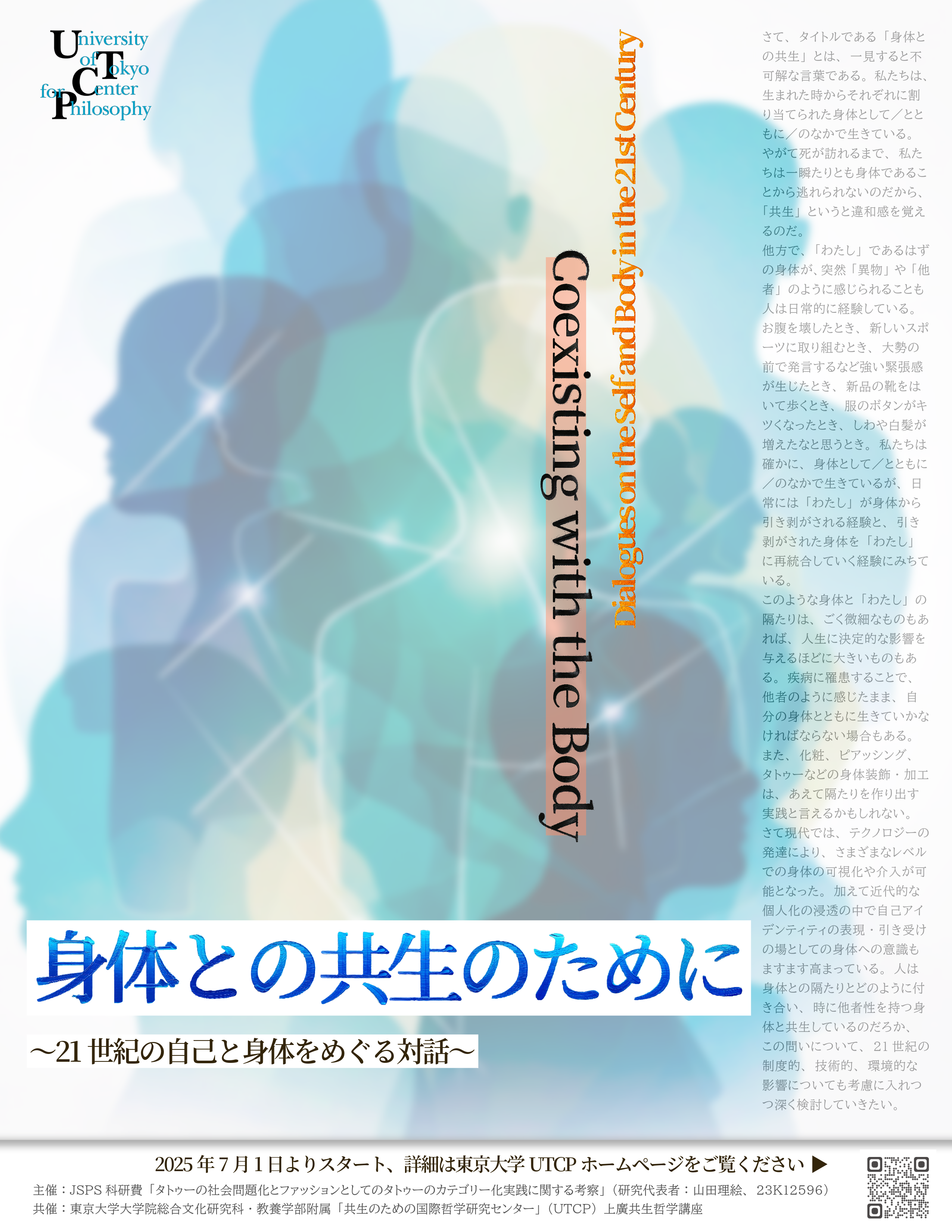
|
Title: | Coexisting with the Body: Dialogues on the Self and Body in the 21st Century, 8th session "Claiming Illness: The Politics of Recognizing Minamata Disease"Registration Required |
||
|---|---|---|---|---|
| Date: | 6:00-8:00 PM, Tuesday, December 2nd, 2025 |
Place: | Room 24. Bldg.101, University of Tokyo KomabaⅠCampus and Zoom |
|
Coexisting with the Body: Dialogues on the Self and Body in the 21st Century
8th session "Claiming Illness: The Politics of Recognizing Minamata Disease"
Starting in July 2025, we will launch a new series titled "Coexisting with the Body: Dialogues on the Self and Body in the 21st Century." This series is co-organized by a JSPS KAKENHI (Grant-in-Aid for Scientific Research) project (Grant Number 23K12596) and the University of Tokyo Center for Philosophy (UTCP).
For this series, we will welcome speakers who are engaged in diverse research and activities broadly related to the concept of the "body" across various specialized fields, including philosophy, anthropology, sociology, medicine, psychology, fashion, theater, and music.
Through their lectures and interviews, we aim to explore questions such as "How do we engage with the alterity of our own bodies?" and "What factors define the unique perspectives on the body in contemporary society?" We also hope to foster discussions that can lead to insights for addressing the various conflicts people face regarding their bodies in modern times.
8th session "Claiming Illness: The Politics of Recognizing Minamata Disease"
Speaker: Akihiro Miyata (Aoba Hospital Sangenjaya Breast Center)
Date: 6:00-8:00 PM, Tuesday, December 2nd, 2025
Location: Room 24. Bldg.101, University of Tokyo KomabaⅠCampus and Zoom
Please register from here.
In person: https://docs.google.com/forms/d/e/1FAIpQLSc631Xl4x-rD1iuul_rPHraI-0r3Gd6g_eoJfNOjL8MFLf--g/viewform?usp=dialog
Onlline: https://u-tokyo-ac-jp.zoom.us/meeting/register/QHCLBEEKQJO5r0Q7Gp8-7A
In 1968, the Japanese government officially recognized Minamata disease as a pollution-related illness caused by wastewater discharged from the Chisso Corporation (then Shin-Nihon Chisso Fertilizer Co., Ltd.). However, even after this official recognition, patients did not immediately receive adequate compensation. Those who had already been certified as having Minamata disease had been constrained by extremely low “consolation payment agreements,” which effectively prevented them from pursuing further claims. At the same time, many “uncertified patients” remained—people who suffered symptoms but were not officially recognized as having the disease. As a result, these individuals had no choice but to file lawsuits, with great desperation and resolve, to have their suffering acknowledged and to be certified as having Minamata disease—that is, as victims. This struggle continues to this day. Although certification of Minamata disease should be based on medical and epidemiological criteria, in practice it has been distorted by its entanglement with compensation issues and the political dynamics surrounding them.
These issues of official “certification” are closely intertwined with the personal difficulty each victim faces in “acknowledging” their own illness. Seeking certification has often subjected individuals—especially within local communities—to prejudicial attitudes, such as accusations that they are merely “after compensation money,” or even slander labeling them as “fake patients.” Beyond the certification system itself, various local circumstances—such as the strong influence of Chisso as the dominant company in the region, or pervasive discrimination—have made it difficult for people to come forward and identify themselves as having Minamata disease. Moreover, the symptoms of Minamata disease, while undeniably damaging to daily life, are often hard to recognize as illness-related, and can be difficult to distinguish from other disorders. Thus, becoming aware that one “has Minamata disease” involves multiple layers of difficulty.
In this session, I will examine these difficulties and reflect on what it means to “acknowledge” an illness. Minamata disease is, of course, a pollution-related illness, distinctive in that it involves clear perpetrators and victims. Yet it may also contain universal lessons.
Akihiro Miyata
Specializes in philosophy, particularly phenomenology, with a focus on Heidegger and theories of language. Served as a Project Researcher in the UTCP Uehiro Research Division for Philosophy of Coexistence until September 2024.
He read The Sea of Sorrow by Michiko Ishimure, which deals with Minamata disease, while in the doctoral program. This prompted him to reconsider Heideggerian discussions of language and community—topics he had previously understood only in abstract terms—from a concrete standpoint grounded in lived reality. By a turn of events, he later visited Minamata several times and continues to study the subject.
Organized by:
JSPS KAKENHI "A Study on the Social Problematization of Tattoos and the Categorization of Tattoos as Fashion" (Principal Investigator: Rie Yamada, Grant Number 23K12596)
Co-organized by:
University of Tokyo Center for Philosophy (UTCP), Uehiro Research Division for Philosophy of Co-existence







